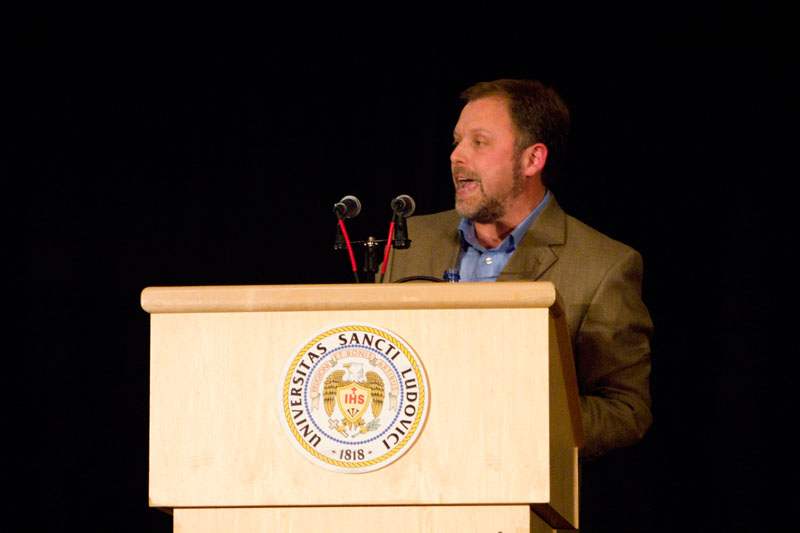 Tim Wise knows it’s not easy to talk about racism. But as one of the most prominent anti-racism writers and educators in the United States, he has an idea or two about how to get the conversation going. So when he came to speak at Saint Louis University on Oct. 28, he eased into the discussion with an important story regarding roommates, household cleanliness and a giant messy pot of gumbo.
Tim Wise knows it’s not easy to talk about racism. But as one of the most prominent anti-racism writers and educators in the United States, he has an idea or two about how to get the conversation going. So when he came to speak at Saint Louis University on Oct. 28, he eased into the discussion with an important story regarding roommates, household cleanliness and a giant messy pot of gumbo.
“I came to understand the most important lesson I had ever learned before then or after that moment,” Wise said, “It didn’t really matter that I hadn’t made the mess. All that mattered was that I was tired of living in that funk. But I was tired of living in the residue of someone else’s actions— actions for which I was not to blame but actions that had an effect on everyone in that house. You see, the same is true with human society.”
Wise is the author of five books, including his latest book, “Colorbind: The Rise of Post-Racial Politics and the Retreat for Racial Equality”. A graduate of Tulane University in New Orleans, he said that his experience in college was one of the greatest factors that influenced his campaign.
“I was in the midst of this really white college, but I was in the middle of a black city demographically and culturally. The contrast was really stark for me.” Wise said.
Wise spoke about how even though we live in what we consider to be a largely post-racism world, race still plays a huge part in our politics and our daily lives, but it’s a topic we are hesitant to have a conversation about.
“It’s sort of like Fight Flub. First rule of fight club: we don’t talk about Fight Club,” Wise said, “And the first rule of race in America is we don’t talk about racism. We can’t talk about it even when it is blatant. “
Wise pointed out how much of our dialogue about government programs and social dynamics changes when we introduce race and minorities into the equation. The effect is subtle, but when the layers of language are peeled away, the presence of racism is very apparent. Wise attested, however, that he did not see the problem of not talking about race until he became a father.
“When you’re a dad or a mom, you look at your kids and you try and figure out how they learn stuff,” Wise said. “I’m obviously concerned about what messages [my kids] are getting and what messages we’re sending and how they are counteracted by messages in our culture.”
The speech concluded with a question and answer session in which Wise addressed issues like the end of white privilege, the government role in the “racialization” of prisons, political correctness, and the recent controversy over the firing of Juan Williams from National Public Radio.
“I think the firing of Williams was ridiculous…not because what he said was okay…but the fact that he acknowledged [his bias] is a good deal better and more helpful than those who deny that those thoughts come into their heads,” said Wise.
The speech was followed by a book signing.
The event was mostly positively received by many of the 1150 students who attended.
“It was a very enlightening speech,” freshman Charles Bowles said. “As a history major, I appreciate that he knew and addressed the history of America.”
Freshman Kunaal Bajwa came to the speech with low expectations, but ultimately enjoyed the event. “I thought it was going to be a boring speech. But I learned a lot and laughed a lot. It’s one of those issues that needs to be talked about.”









